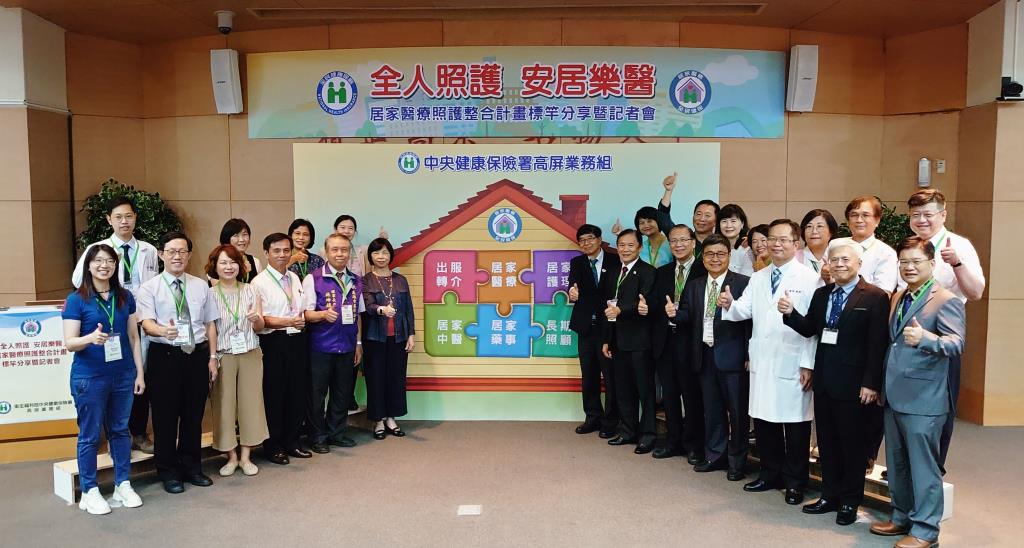
At 89 years of age, Grandpa Wang suffers from the aftereffects of stroke, dementia, and diabetes. As he grows increasingly weak with each passing year, every illness (such as fever) has necessitated ambulance transportation and hectic nights at the hospital, all of which are extremely overwhelming for Grandpa’s primary caretaker, his 69 year-old wife. In 2018, the hospital issued a referral to a clinic near their home requesting home visits once a month and assisted in applying for the “take-a-break” services encompassed by long-term care. Today, Grandpa Wang enjoys relatively stable health, and his wife is finally relieved of the heavy psychological and economic burdens she had borne for so many years.
Ms. Chu’s parents have been in and out of the hospital on multiple conditions for various diseases. Her father became deteriorated in 2017 due to the metastasis of cancer cells to the brain, and providing adequate care for him became extremely difficult. Following consultation with family members and the palliative home care team, she decided to let her father continue enjoying the comforts of home while receiving professional palliative care. During one of the routine home visits, the team discovered that Ms. Chu’s mother was also suffering from aggravated Parkinson’s disease and panic disorder, and immediately responded by enrolling her in the program and adjusting her medication, enabling her to also enjoy the comfort and convenience of home-based care. Ms. Chu is extremely grateful for the assistance of the home care team--for the detailed instructions on caring for her parents given by the medical personnel, for their empathy and company, and for giving her the courage and support to continue caring for her family.
For those families with debilitated patients, home care service is so important. It has been four years since the National Health Insurance Administration (NHIA) first launched the “Integrated Home Medical and Nursing Care Project,” (the Project) which has now seen the participation of 221 teams and 2,816 medical institutions. In the Kaohsiung, Pingtung and Penghu regions alone, 32 teams and 490 medical institutions have provided care to over 10,000 patients. To expand the scope of home care services offered, the Project not only began providing traditional Chinese medicine and pharmacy home care in June, 2019, a system for ensuring seamless transition from inpatient care to home care has been established while channels for obtaining home care and Long-Term Care 2.0 are now integrated and coordinated.
Aside from access to Western medicine, traditional Chinese medicine and pharmacy home care services have now been made available with 67 Chinese medicine practitioners and 39 pharmacies (9 each in the Kaohsiung and Pingtung regions) joining the project nationwide. The NHIA Kaohsiung and Pingtung division held a press conference today (14th) honoring benchmark home care teams at which Po-Chang Lee, Director General of the NHIA as well as associations, departments of health and long-term care providers serving the Kaohsiung, Pingtung and Penghu regions jointly engaged in a care service collage activity to declare the integration of home care resources and cross-sector services. Families of enrolled patients were invited to share their thoughts on the home care journey, while medical teams from benchmark institutions were called upon to share their experience of providing adequate care in the home environment to call for expanded participation from more medical institutions, and to educate the general public to access these services. It is hoped that through these efforts, all patients in need may receive holistic care that encompasses all aspects of life--from physical, psychological, to social and spiritual.
If you happen to know or are caring for a debilitated/disabled person who would benefit from home medical and nursing care, you may look up the nearest medical institution providing such services via the NHIA’s official website (www.nhi.gov.tw→NHI Services→NHI Medical Programs→Other home care-related medical services→Contracted health facilities for Integrated Home Medical and Nursing Care). You may also call the long-term care hotline (1966 across all regions in Taiwan) or visit the care facilities in your city or county for further information. Professional long-term care staff will assist in evaluating the mode of long-term care you may require, and direct you to proper the medical and nursing resources.

